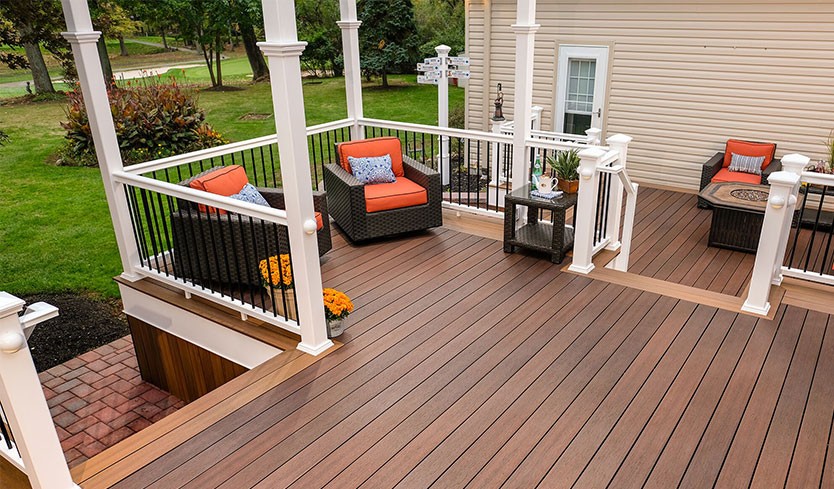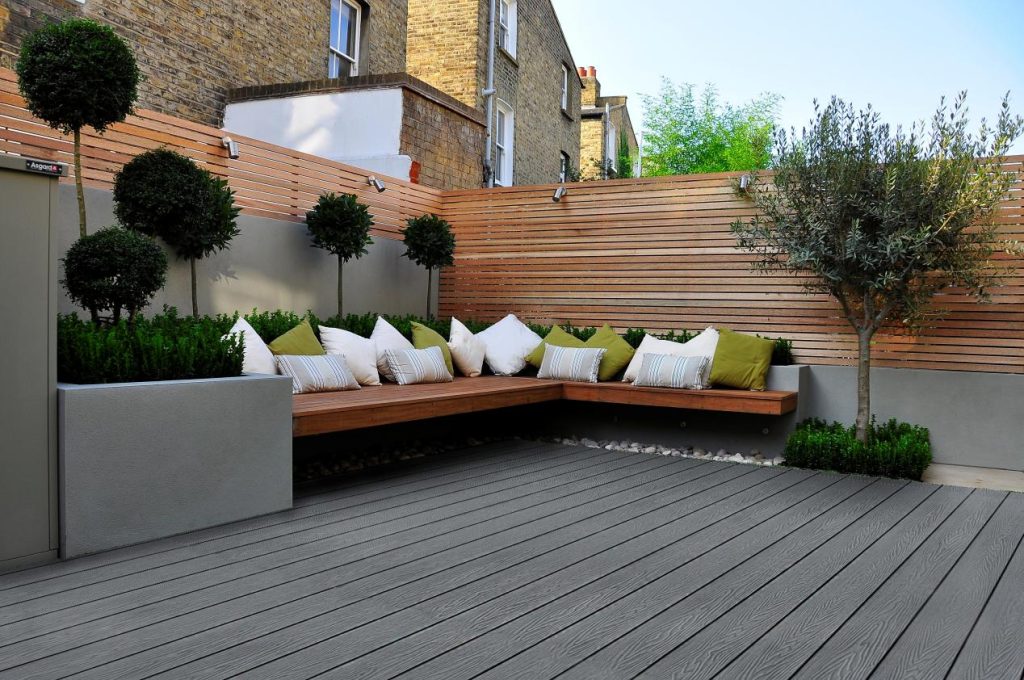Creating a stylish and low-maintenance outdoor space is easier than ever with composite decking. Whether you’re planning a patio, pool deck, or rooftop area, composite decking is a top choice for its durability and eco-friendly design. If you’re ready to buy composite decking but unsure where to start, this guide covers everything you need to know—from types and pricing to key buying tips.
Table of Contents
Why Buy Composite Decking?
Before we go into the specifics of what to look for, it’s important to understand why so many people choose to buy composite decking instead of traditional wood or PVC.
1. Durability
Composite decking is resistant to rot, mold, mildew, termites, and warping. Unlike natural wood, it doesn’t split or crack over time, making it perfect for all climates.
2. Low Maintenance
Forget about annual sanding, staining, or sealing. A simple wash with soap and water is usually all that’s needed.
3. Aesthetic Appeal
Modern composite boards mimic the appearance of real wood, with rich grain patterns and varied colors. Whether you want a rustic, tropical, or modern look, there’s a composite option for you.
4. Eco-Friendly
Most composite decking boards are made from recycled plastic and reclaimed wood fibers, reducing environmental impact.
5. Long-Term Value
While the upfront cost may be higher than timber, composite decking offers significant savings over time thanks to lower maintenance costs and longer lifespan.
For these reasons and more, it makes sense to buy composite decking if you want a beautiful, long-lasting, and worry-free outdoor space.
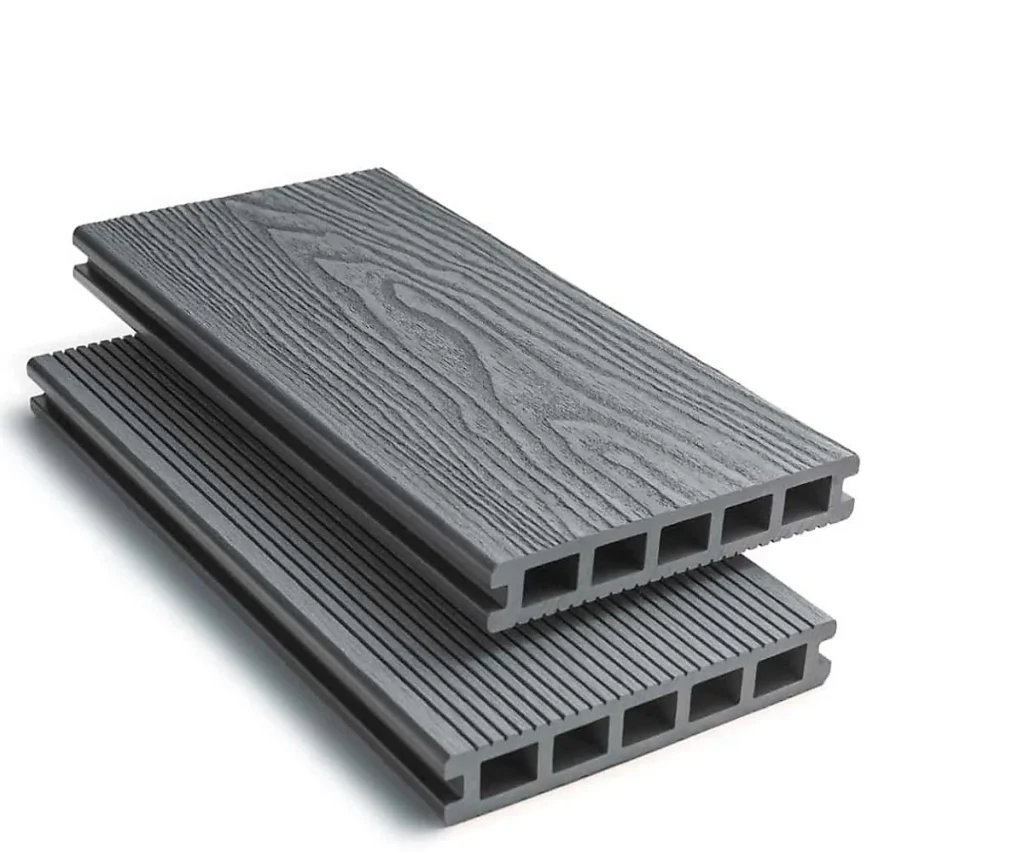
Types of Composite Decking
Understanding the types of composite decking is essential before you make a purchase. Each type offers unique benefits in terms of durability, appearance, and budget. Choosing the right one based on your environment and usage will ensure you get the most out of your investment.
1. Capped Composite Decking
These boards are wrapped in a polymer shell that acts as a protective barrier against stains, fading, mold, and moisture. The cap also enhances color retention and resistance to UV rays, making them ideal for decks in sunny or humid climates. Available in a wide range of colors—from deep wood tones like walnut and mahogany to modern grays and taupes—capped decking offers a premium look with minimal upkeep.
2. Uncapped Composite Decking
More affordable than capped boards, uncapped options have no protective shell, making them slightly more vulnerable to weathering over time. However, they still outperform traditional wood when it comes to moisture resistance and lifespan. Uncapped decking is a good choice for covered or shaded areas where exposure to direct sun and rain is limited.
3. Solid Composite Boards
These boards are denser and heavier, providing superior strength and a solid underfoot feel. They are ideal for high-traffic areas, commercial decks, or installations with elevated frames. Solid boards tend to mimic the natural look and grain of real timber, making them a preferred choice for luxury applications.
4. Hollow Composite Boards
Designed to be lightweight and easy to install, hollow boards feature internal voids that reduce weight without compromising too much on strength. They are cost-effective and suitable for residential projects, especially where budget and DIY-friendliness are important factors. Hollow boards also allow for better airflow, which can be helpful in humid environments.
Composite Decking Type Comparison Table
| Type of Decking | Appearance | Weight | Best Use Cases | Color Options |
|---|---|---|---|---|
| Capped Composite | High-end, rich colors | Medium | Sunny or wet climates, pool decks | Wide range of wood tones, greys |
| Uncapped Composite | Natural look | Medium | Shaded areas, low-traffic zones | Earth tones, browns |
| Solid Composite | Authentic wood feel | Heavy | Commercial decks, high-traffic patios | Realistic woodgrain finishes |
| Hollow Composite | Clean and modern | Light | Residential patios, DIY decks | Browns, greys, light tones |
When you plan to buy composite decking, it’s critical to match the board type with your deck’s specific location, usage intensity, and budget. Also, consider the color that will complement your home’s exterior—some prefer rich wood tones like teak or walnut, while others opt for cooler, modern shades like charcoal, silver gray, or even sand beige for coastal themes.
By selecting the right combination of type and color, you can enhance both the function and aesthetics of your outdoor space for years to come.
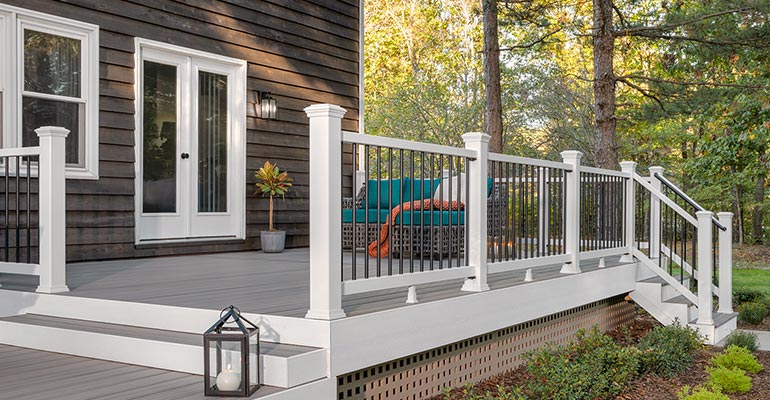
Materials Used in Composite Decking
Composite decking is typically made of a combination of wood fibers and recycled plastics. This mix is compressed and shaped into durable boards. Here are the key materials involved:
Recycled Plastic (HDPE, LDPE) – Provides water resistance and flexibility
Wood Fiber or Sawdust – Gives the board structure and a wood-like appearance
Color Pigments and UV Inhibitors – Protect from sun damage and fading
Resins and Binders – Ensure uniform strength and durability
The quality of these materials varies from brand to brand. When you buy composite decking, check the ratio of wood to plastic and look for certifications or product testing reports.
Key Factors to Consider Before You Buy
To make a smart purchase, consider the following aspects before you buy composite decking:
Deck Usage
Will it be a quiet backyard lounge or a high-traffic rooftop deck? If you plan to place heavy furniture, grills, or host frequent gatherings, opt for thicker and more durable boards to avoid sagging or flexing over time.Climate Conditions
In rainy or humid environments, capped composite decking with anti-slip surfaces is crucial for safety and durability. In regions with strong sun exposure, select boards with built-in UV stabilizers to minimize color fading and warping.Aesthetic Preferences
Composite decking comes in a wide variety of colors and finishes. From warm browns like walnut and teak to cool greys and silvers, there’s a shade for every style. You can also choose from smooth finishes or embossed woodgrain textures for a more natural look.Board Size and Thickness
Standard sizes range from 25mm to 30mm, with heavy-duty options available in 1.5 inch or 2 inch thicknesses. Thicker boards are ideal for commercial or elevated decks where added strength is required.Warranty
A comprehensive warranty (usually between 10 to 25 years) reflects the manufacturer’s confidence in product performance. Look for coverage against fading, staining, and structural failure—and avoid suppliers that don’t provide any warranty at all. A strong warranty adds peace of mind and long-term value.
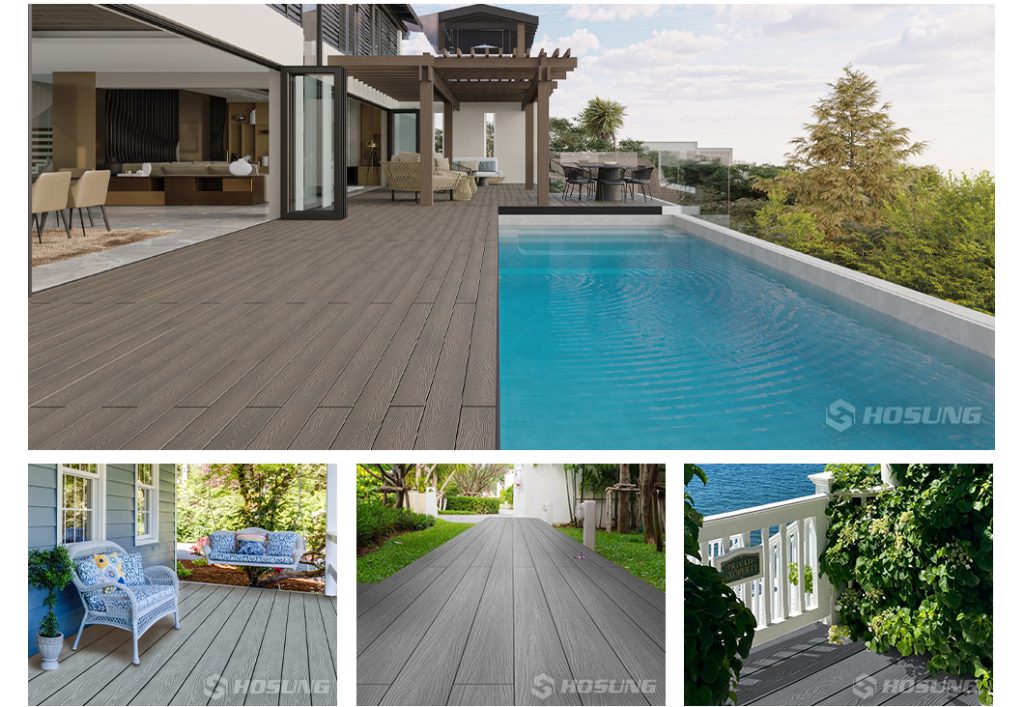
Price Guide: What to Expect When You Buy Composite Decking
Here’s a general price comparison to help you budget:
| Type of Board | Price per sq. ft (USD) |
|---|---|
| Hollow Uncapped | $2.00–$3.50 |
| Hollow Capped | $3.00–$4.50 |
| Solid Capped | $4.50–$6.50 |
| Premium Textured Boards | $6.50–$9.00+ |
Additional costs may include:
Joists and substructure
Fasteners or hidden clip systems
Edge trims and fascia boards
Labor (unless DIY)
While cheaper options are available, don’t sacrifice quality for cost. Choose a reputable supplier when you buy composite decking to avoid premature failure or poor performance.
How to Calculate How Much Decking You Need
To avoid waste or shortages, follow these steps:
Measure the deck area (length × width)
Convert area to square footage or square meters
Check board dimensions to calculate coverage
Account for spacing between boards
Add 5–10% for cuts, errors, and future repairs
Many suppliers offer online calculators or can help you estimate quantities before you buy composite decking.
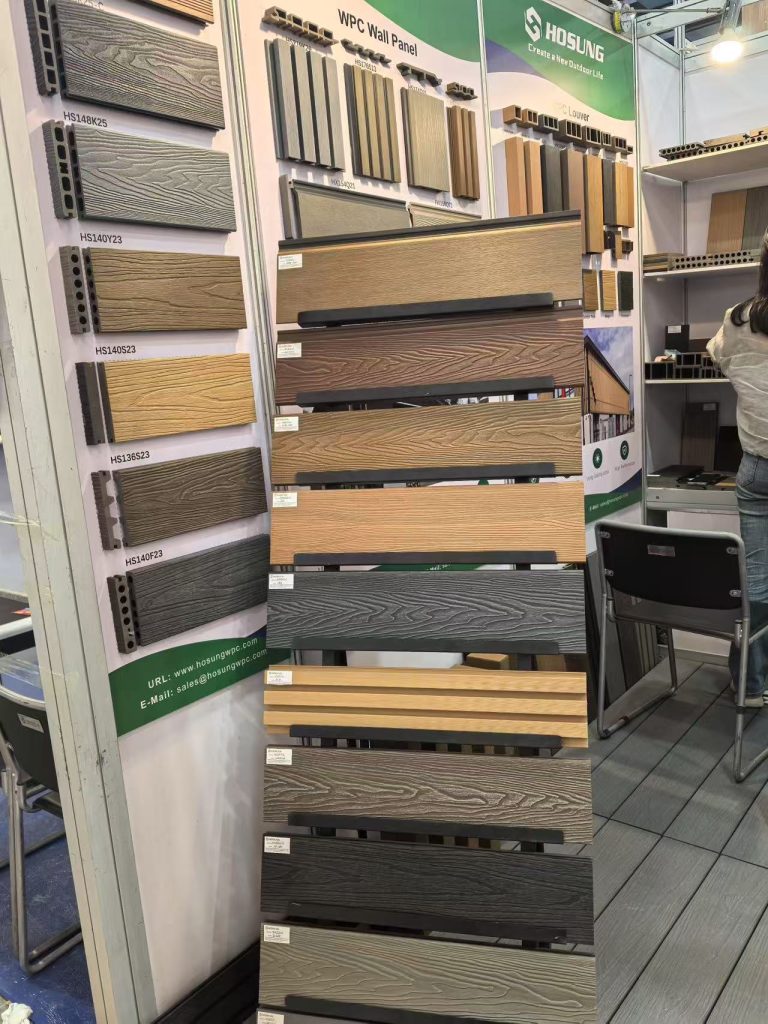
Where to Buy Composite Decking: Online vs. Local
When deciding where to buy composite decking, you typically have two options:
1. Online Retailers & Direct Suppliers
Pros:
More choices
Competitive pricing
Convenient home delivery
Cons:
Can’t see or touch before purchase
Shipping delays possible
2. Local Stores or Distributors
Pros:
Physical inspection of products
Immediate pickup
Local installation services may be available
Cons:
Limited stock or fewer styles
Higher prices due to overhead costs
Regardless of where you buy, make sure to compare warranties, customer service, and return policies.
Why Hosung Composite Decking is a Trusted Option
When you’re ready to buy composite decking, Hosung offers a dependable choice with a wide range of styles and thicknesses. Their products are:
Made with eco-friendly materials
Available in hollow and solid designs
Engineered for high strength and low maintenance
Backed by reliable warranty policies
Hosung’s composite decking boards come in attractive finishes and colors, suitable for residential and commercial use. Their streamlined production and quality control make them a valuable partner for those who want both affordability and performance.
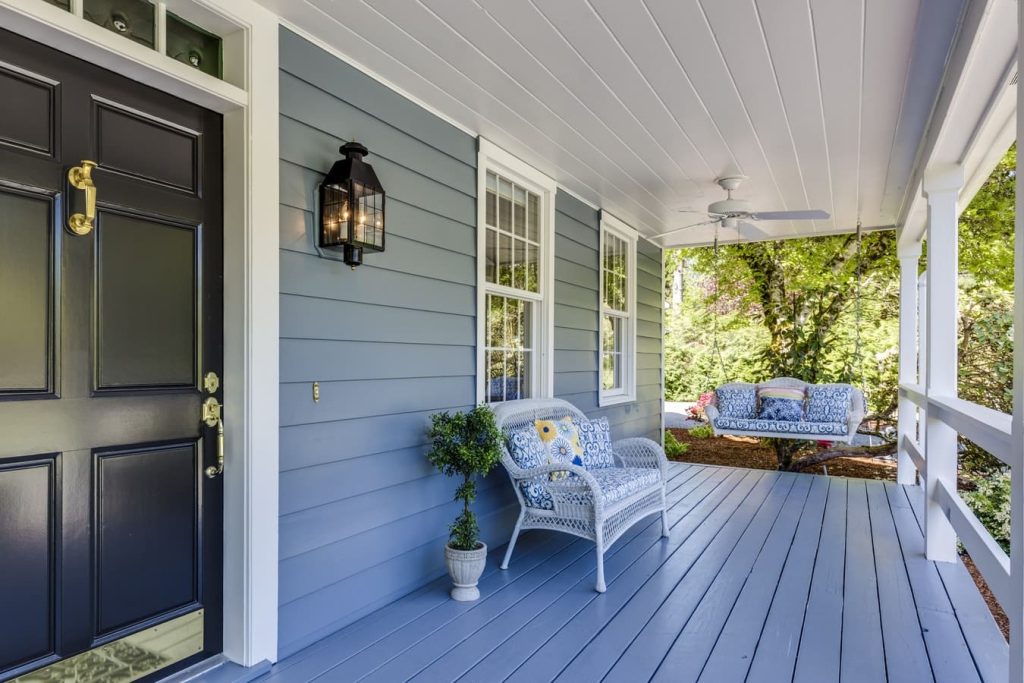
Common Mistakes to Avoid When You Buy Composite Decking
Avoiding these common pitfalls will ensure you get the most from your investment:
1. Buying the Cheapest Option Available
Low-cost boards may lack structural integrity, fade quickly, or have poor slip resistance.
2. Ignoring Board Thickness
Thinner boards may flex or break if not supported properly. Match the board thickness to the application.
3. Skipping the Warranty
Products without a warranty can cost you more in the long run. Look for coverage of at least 10–15 years.
4. Not Ordering Extra Material
Always buy 5–10% extra to cover mistakes, custom cuts, or future repairs.
5. Forgetting About Fasteners
Different boards require specific clip systems or screws—factor this into your budget and planning.
Conclusion: Make the Right Choice When You Buy Composite Decking
our outdoor deck is an investment in your lifestyle and property value. With the right knowledge and a clear understanding of your needs, you can confidently buy composite decking that performs well for years to come.
From understanding the differences in board types and materials, to knowing how much to order and where to buy, this guide gives you all the tools you need. Choose a trusted supplier like Hosung, assess your deck requirements, and make informed decisions that pay off in comfort, appearance, and longevity.
Ready to upgrade your outdoor space?
Now is the time to buy composite decking from Hosung WPC that fits your vision, budget, and climate. Build smart, build beautiful—and enjoy your deck for decades.


